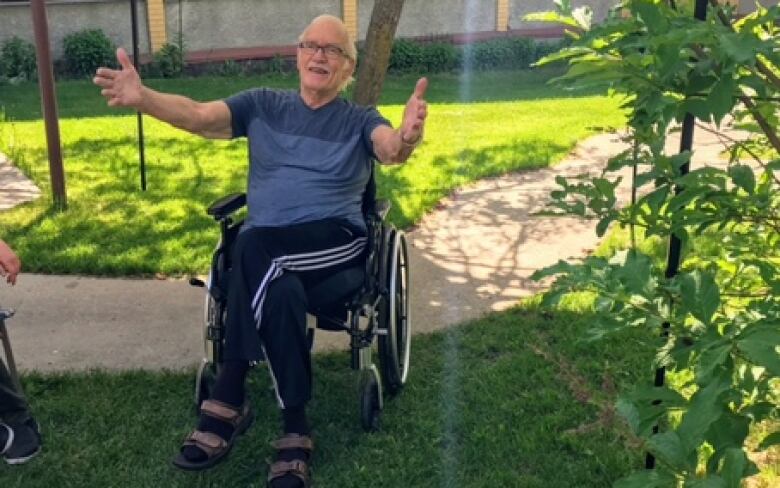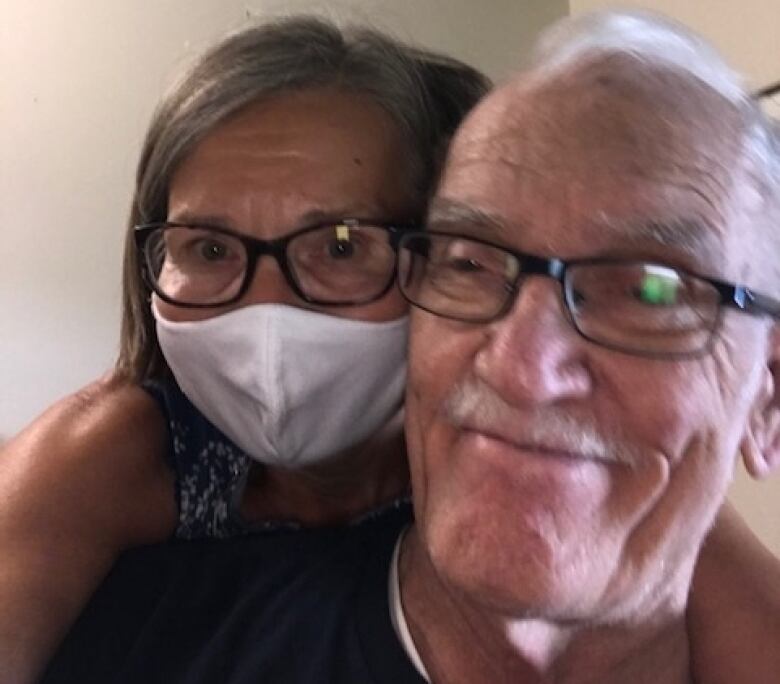With most Manitoba care homes in lockdown, families struggle to care for loved ones living with dementia
Aspects of disease, memory loss make communicating over the phone a challenge

It should have been a happy moment, but instead, Justina Bergmann's first in-person visit in months with her husband was filled with stress and confusion.
Bergmann's husband, Rudy Pankratz, suffers from Alzheimer's disease and lives in the Bethania Mennonite Personal Care Home in Winnipeg.
After weeks of no contact at the start of the COVID-19 pandemic,Bergmann was finally able to visit him outside in June, while standing behind a fence. But because of his advanced Alzheimer's, Rudy couldn't understand why his wife was standing several feet away, unable to hug or touch him.
"It was like a jail. So I was on the one side, and he was on the other side, and he reached out his hands and he says, 'I need to hug,' but he couldn't," Bergmann said.
Eventually, as restrictions relaxed later in the summer, the two were able to spend time together in the care home. Though it wasn't the same as before, being able to visit him over the summer was a comfort, she said.
Now, she's not sure how they'll get through a second lockdown.

As COVID-19 case numbers and deaths have soared in Manitoba, and particularly Winnipeg, in recent weeks, the province has once again limited visits to many care homes.
As of Friday, more than two-thirds of personal care homes in Winnipeg were dealing with outbreaks of COVID-19, officials from the Winnipeg Regional Health Authority said, bringingsevere restrictions on visitation at the homes.
Though the province is still allowing designated family caregivers into personal care homes, the outbreaks mean no visitations at all for some, including at the care home where Bergmann's husband lives.
The last time Bergmann was allowed to visit her husband waswas on Nov. 1. While she can understand the reason for public health orders restrictingvisits, her husband can't.
"Last night when I was talking to him, he says, 'I just need to cry.I just can't handle this anymore,'" she said.
"It's inhumane. That's what it feels like to me. But I don't know what the answer is. The damage that will be done,I can already tell it will be worse than it was before."
Stories like Bergmann's have been heartbreakingly common during the pandemic, says a group that advocates for those living with dementia.
Long hours alone
The province's restrictions mean people living in long-term care homes will be spending long hours alone, which leads to decreased brain stimulation, said Erin Crawford, program director for the AlzheimerSociety of Manitoba.
Even when visits are allowed, the need to be physically distant can make them stressful, because the person with Alzheimer's can't understand the reason for the distancing. Theymay also have other impairments like hearing loss, she said.
"And then when families can't get in at all, families are feeling worried. They're feeling guilty. They're concerned for their loved ones. And we're just hearing heartbreak on the part of families because they want to be there," she said.
People who have family members with Alzheimer's or dementialiving at home are also struggling, Crawford said.
Without access to the various programs and support services they relied on, it's harder to keep a loved one with dementia active and engaged, Crawford said.
"We're hearing a lot from people who have a loved one at home about perhaps even seeing what they would describe as an accelerated decline, because of the lack of some of the program opportunities that used to be there."
Visitations critical
Roxanne Chopee went nearly three months without seeing her mother, who has advanced dementia and lives at Winnipeg's River East Personal Care Home, this spring.
Even when outdoor visits were allowed, not being able to have physical contact was hard because her mom is non-verbal.
"You still couldn't get close enough to actually let them know you were there," she said.
"My mom, because of her disease, you really need to interact with her physically: touch her shoulder, hold her hand, look her straight in the eyes, that sort of thing.
"So I wasn't able to do any of that."
Though her mom can't talk, Chopee says she'll sometimes squeeze her hand or smile at her when she visits.
"I mean, she might do that for everyone. I'm really not sure," she said.
"But I know that when she does that, at least she's in a comfortable place and that she's happy with you being around."
An associate professor who studies interactions with the home-care system and personal care homes saysthere's an unfortunate stereotype that people with dementiaor other cognitive impairments might not be as affected by the isolationwhich is simply not true.
"I've seen comments like, 'Oh, they're often so far gone. They don't need that kind of support, or thathuman connection.' But they really, really do," said the University of Manitoba'sLaura Funk, who studies family caregiver experiences.
"And we're seeing some of the research and anecdotal reports that people are seeing deterioration in their family members because of the lack of that social connectionand really going downhill in their health because they're not having enough social context."
Need for balance
Crawford said the families she works with through the AlzheimerSocietyunderstand the need for restrictions, and are grateful to personal care home staff for all they're doing to keep residents safe.
But as Manitoba heads into another period of strict public health orders, something needs to be done to keep those connections alive, she said.

"I don't think families should have to give up one or the other. I don't think that they should be in the position of having to say, 'Yes, we'll sacrifice our ability to visit our loved one, we'll sacrifice that relationship, we'll sacrifice that closeness in the interest of safety,'" she said.
"I think that's putting too much on the backs of those families to the detriment of everybody. And so I think we would really welcome conversations about how we can creatively meet both of those objectives."
Justina Bergmann, meanwhile,just wants to be able to tuck her husband in at night.
"He's so fragile, and I think that if I was able to be there at night and tuck him in and wait until he fell asleep, that just would give me a lot more comfort."
With files from Kim Kaschor












_(720p).jpg)


 OFFICIAL HD MUSIC VIDEO.jpg)
.jpg)



























































































